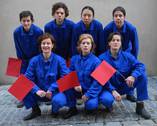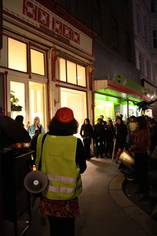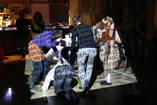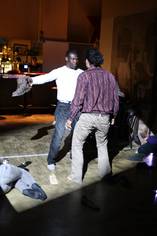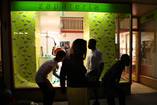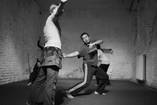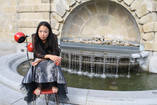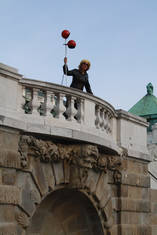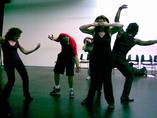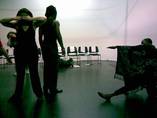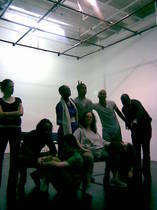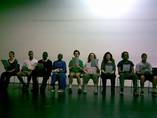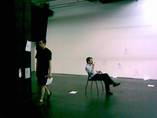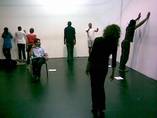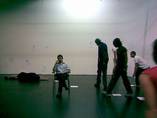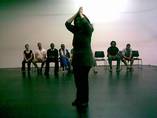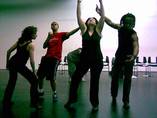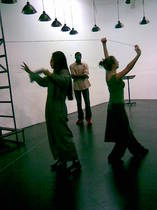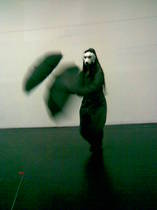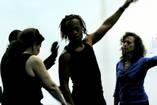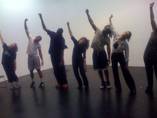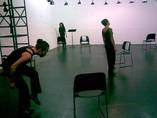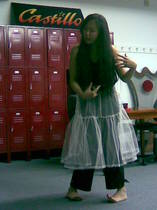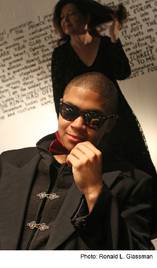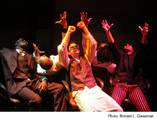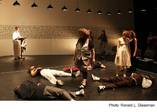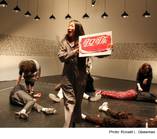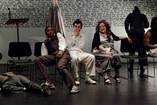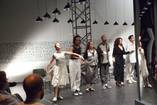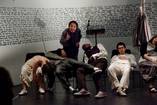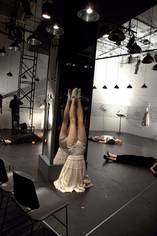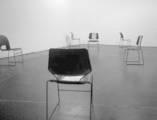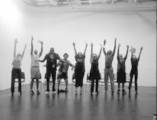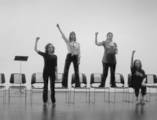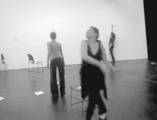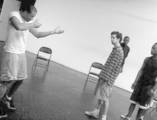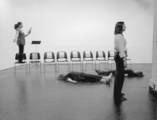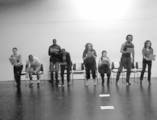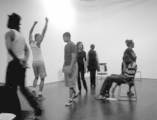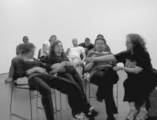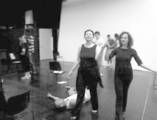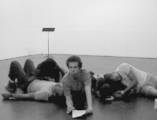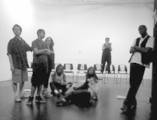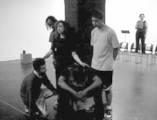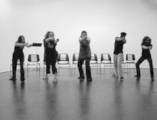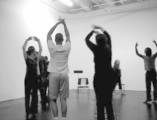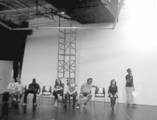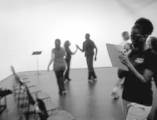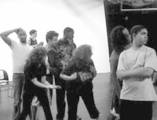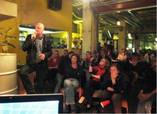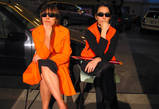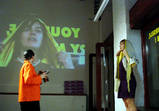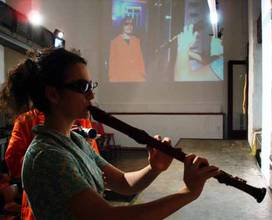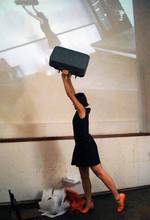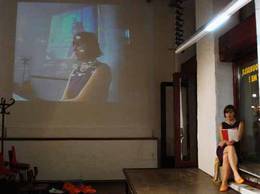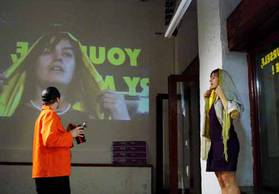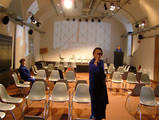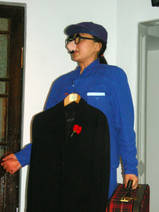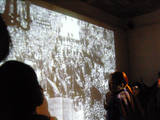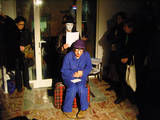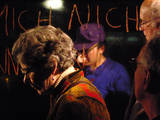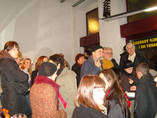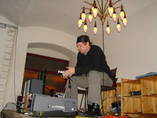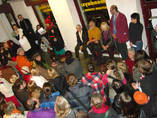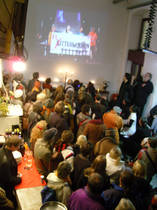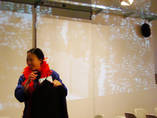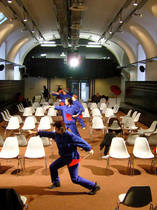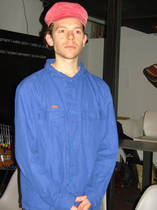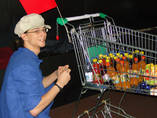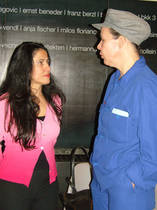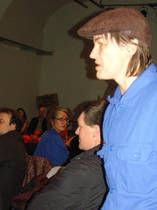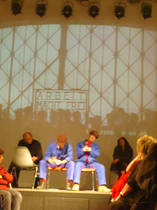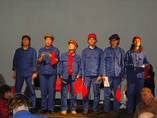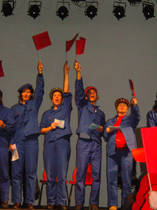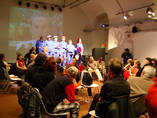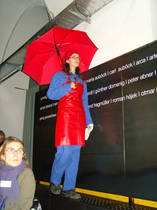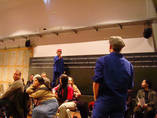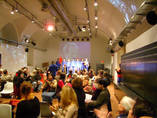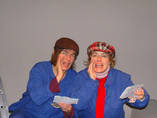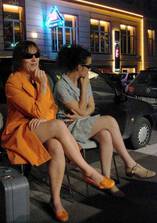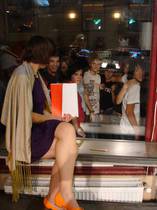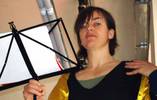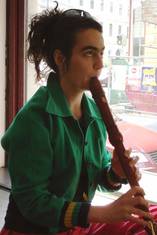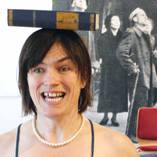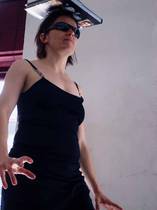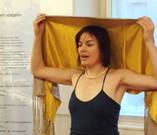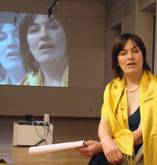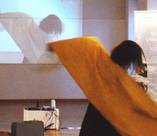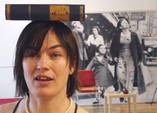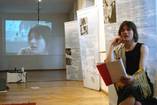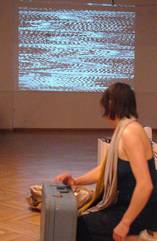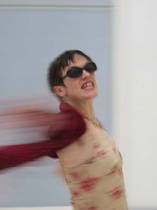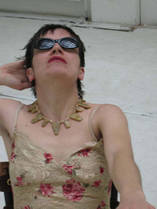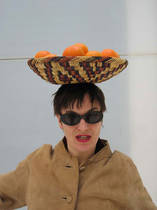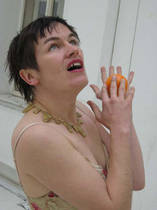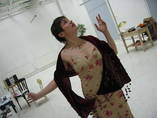| Kirchengasse 44, A-1070 Vienna, Phone/Fax +43/1/5222375 | ||||||||||||||||||||||||||||||||||||||||||||
|
|
||||||||||||||||||||||||||||||||||||||||||||
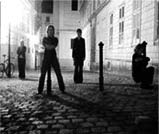
|
 |
|||||||||||||||||||||||||||||||||||||||||||
|
|
||||||||||||||||||||||||||||||||||||||||||||
Podiumsdiskussion
Die soziale Lage von Kulturschaffenden in Österreich ist prekär. Sie befinden sich oftmals in einer schwierigen ökonomischen und sozialen Situation. Am Podium diskutieren Daniela Koweindl (IG- Bildende Kunst), Eva Brenner (FLEISCHEREI, Experimental Theater) und Randolf Destaller (GPA work@flex und BSA).work@flex und BSA).work@flex und BSA). Diese Veranstaltung wird von der neuBASIS Wien im BSA organisiert.
Termin: Mo., 29. März 2010, 19h (Einlass aber 18h30)
Maren Rahmann präsentiert die FLEISCHEREI zum 10-Jahresjubiläum des KosmosTheater. Zum 10. Geburtstag des KosmosTheaters überbringen Künstlerinnen, die mit der Geschichte des Hauses untrennbar verknüpft sind, ihre ganz speziellen Glückwünsche. Das gesamte Theater - von den Nebenräumen bis zum Saal - wird Bühne, wenn in einem 10-stündigen Marathon Leckerbissen der unterschiedlichsten Kunstsparten präsentiert werden. Sa., 13. März 2010, 19h
"Menschen sind wir einst vielleicht gewesen" Maren Rahmann singt, spricht und musiziert auf der Ziehhamonika selbstvertonte Jura Soyfer-Texte. (u.a. Lied des einfachen Menschen, Wies zugeht auf der Welt, Matrosenlied, Sturmzeit) Maren Rahmann singt, spricht und musiziert auf der Ziehharmonika selbstvertonte Jura Soyfer Texte. (u.a. Lied
On the basis of our experimental socio-theatrical working methods last developed in the innovative street theater project "AUF ACHSE 09"/”ON AXIS 09” realized as a theatrical procession with artists, migrants, refugees and small businesses in the public space of Vienna, we will present a newly adapted version for Mexico. It will use personal and biographical stories of participants derived form a 10-day workshop and relate closely to the city, spaces, people and landscapes of Guanajuato on relevant issues of migration, participation and coexistence in a multicultural society. Within a creative interplay between artists from Austria and Mexico – with the participation of migrants, businesses and/or street sellers- the group will develop from improvisations visual, musical and theatrical scenes in three parts with personal texts and literary fragments (Elfriede Jelinek, Heiner Müller, Aischylos) dealing with topics of migration. The spatial and interactive scenes are performed as a theatrical procession on site-specific locations in Guanajuato – in streets, cafes and restaurants. Part 1: Dream Factory or dreaming of a new beginning
The End of Enlightenment
|
||||||||||||||||||||||||||||||||||||||||||||
eopictureNight10+5 |
eopicture lädt ein zur fünften
eopictureNight10+5
Themen diesmal:
- Jana Herwig:
Tiere, Texte, Interfaces, Interspecies - Eva Brenner:
Fleischerei - Goran Ritan:
Blue Green Life - Franz Kumpl:
Maultrommel - Charlotte Zott aka Sari:
Plate Exchange Project - Elsy Lahner und Alexandra Grausam:
Das Weisse Haus - Florian Ledermann:
KUNSTWIEN
eopictureNight10+5 ist ein Kommunikations-Format, um Projekte in kurzer Zeit einem Publikum vorzustellen und sich dabei Feedback, Tipps und andere Perspektiven zu holen. Die / der Vortragende präsentiert 10 Bilder und spricht zu jedem Bild 20 Sekunden. Anschließend stellt sie/er 5 Fragen an das Publikum. Im Anschluss an die Präsentationen wird an verschiedenen Tischen zu den Fragen und den einzelnen Projekten diskutiert.
Termin: Mittwoch, 22. April
Beginn: 19 Uhr
Veranstaltungsort: werkzeugH, 1050 Wien, Schönbrunner Straße 61
http://www.werkzeugh.at/blog/where/
GASTSPIEL | BRATISLAVA 2008 |
Auf diesem dunkelnden Stern
SOLO-Performance mit Maren Rahmann nach Texten von INGEBORG BACHMANN
21. OKTOBER 2008, Beginn: 18.00h
Österreichische Botschaft | Mozartsaal
Ventúrska 10, 811 01 Bratislava
Mitwirkende:
Performance: Maren Rahmann
Regie: Eva Brenner
Komposition & Live Musik:
Angélica Castelló
Raum & Projektionen:
Andreas Pamperl
Künstlerische Leitung:
Eva Brenner &
Maren Rahmann
Tourneegestaltung:
Annemarie Klinger
Eine Produktion von FLEISCHEREI - PROJEKT THEATER STUDIO phase 2, Wien
Die Solo-Performance von Maren Rahmann, musikalisch unterstützt von Angélica Castelló, montiert einen repräsentativen Querschnitt aus dem Werk Ingeborg Bachmanns zu einem spannenden Abend für eine Schauspielerin.
Gedichte aus verschiedenen Lebensphasen sowie Auszüge aus Reden, Essays und dem Roman „Malina“ zeigen eine Autorin, die sich schonungslos aussetzte und zugleich Stellung nahm, unbeirrbar in ihrer Suche nach Authentizität und mit ihrer sprachgewaltigen Widerständigkeit.
Neben der zentralen Bedeutung der Texte Ingeborg Bachmanns spielen die betonte Musikalität der Sprachbehandlung und die Verwendung von Live-Video eine wichtige Rolle. Aus der Differenz zwischen Körper und filmischer Ab-Bildung, Raumbild und Nahaufnahme, über die sich das Wort erhebt, der fokussierten Präsenz der Zuschauer – auch sie finden sich auf den Videobildern wieder – entsteht eine ungewöhnliche theatrale Spannung.
Im Hier und Jetzt des Spiels gelingt der Aufführung eine faszinierende und beunruhigende Annäherung an ein „Monument“ der österreichischen Literatur.
Auskunft und Tickets: http://www.embassyaustria.sk/progra/program.aspx?l=De&t=Month&v=10/2008
Das Programm
OUVERTÜRE: EXIL (1957, aus: Werke, Piper, 1982, Bd. 1)
- Utopisches Land (aus: „Ein Tag wird kommen“, Gespräche in Rom, Porträt von Gerda Haller, 2004, Sequenz 16)
- Keine Delikatessen (aus: „Letzte unveröffentlichte Gedicht, Edition& Kommentar Hans Höller, 1998)
- Kriegstexte (aus: MALINA, 1971, und div. Interviews)
- Alkohol (aus: „Ich weiß keine bessere Welt“, 2000)
- Die Wahrheit ist dem Menschen zumutbar – (Rede zur Verleihung des Hörspielpreises der Kriegsblinden, 1959, Werke; Bd. 4)
- Schweigen befohlen (unveröffentlichtes Gedicht)
- Musik und Dichtung (Werke, Piper, München, 1982, Bd. 4)
- Müd und Untauglich (aus: „Ich weiß keine bessere Welt“)
- Meine Schreie (aus: „Ich weiß keine bessere Welt“)
- Werbung (aus: „Ich weiß keine bessere Welt“)
- Auf das Opfer darf keiner sich berufen (aus: Vermischte Schriften, Werke Bd. 4)
- Ein Tag wird kommen... (aus: MALINA)
- Die gestundete Zeit (1959, Werke, ibid., Bd. 1)
- Aufruf zum Protest gegen den Krieg in Vietnam (Dezember 1945)
- Die Waffen nieder! (aus dem Nachlass)
- Böhmen liegt am Meer (1964, aus Hans Höller: „Letzte unveröffentlichte Gedichte“)
- Gespräch mit Ingeborg Bachmann, 14.-20. Juni, 1973 (aus: „Ein Tag wird kommen“, Gespräche in Rom, Porträt von Gerda Haller, 2004, Sequenz 16)
- Keine Welt ohne neue Sprache (aus: Das dreißigste Jahr“, 1961, Werke Bd. II)
CODA: Ihr Worte (1961, Für Nelly Sachs, Gedichte, Werke Bd. 1)
Days of Theatre Weßenbach 08 (Theatertage Weißenbach 08 |
ON THIS DARKENING STAR
SOLO-Performance with Maren Rahmann
based on texts by INGEBORG BACHMANN
AUGUST 3rd 2008, 8 pm
Weissenbach bei Haus im Ennstal - theaterlandHAUS
Performance: Maren Rahmann (D)
Mise-en-scéne: Eva Brenner (A/USA)
Composition & Live Music: Angélica Castelló (MEX)
Space& Projections: Andreas Pamperl (A)
Tourmanagment: Annemarie Klinger (A)
Artistic Directors: Eva Brenner & Maren Rahmann
The cult-performance with Maren Rahmann (world premiere in 2004, Dublin, Irland) is now in its fourth year and will be shown in a newly adapted version!
Supported by music of Angélica Castelló the ensemble has montaged a representative corsscut from the works of author, Ingeborg Bachmann (died 1973) to fashion an exciting evening for one actress. Poems from different life phases as well as speeches, essays and excerpts form the novel, "Malina", expose the writer Bachmann as one of radical personal and existential statement, unerring in her search for authentticity and full of strong poetic power, a speech-power targeting restistance.
The aesthetic form is shaped by the central role of the texts, a pronounced musicality and a stunning use of live-video projection, incorporating original film-material of Bachmann's last visit to Poland in 1973.
Theatrical tension derives from the split between body and text, cinematic imagery, simplistic spatial concept, and close-up focusing the presence of actess and audiences alike which finds itsself pictured in the moving video-images. Above all of this rides language - sometimes soflty, sometimes violent. It is due to the Here and Now of an unusually intimate "play" that the performance creates ist fascinating and disquieting, as yet radically modern approach to this "monument" of Austrian literature.
Information and tickets:
www.theaterland.at
office(at)theaterland.at
Tel.: ++43 3571 20043
Das Programm
OUVERTÜRE: EXIL (1957, aus: Werke, Piper, 1982, Bd. 1)
- Utopisches Land (aus: „Ein Tag wird kommen“, Gespräche in Rom, Porträt von Gerda Haller, 2004, Sequenz 16)
- Keine Delikatessen (aus: „Letzte unveröffentlichte Gedicht, Edition& Kommentar Hans Höller, 1998)
- Kriegstexte (aus: MALINA, 1971, und div. Interviews)
- Alkohol (aus: „Ich weiß keine bessere Welt“, 2000)
- Die Wahrheit ist dem Menschen zumutbar – (Rede zur Verleihung des Hörspielpreises der Kriegsblinden, 1959, Werke; Bd. 4)
- Schweigen befohlen (unveröffentlichtes Gedicht)
- Musik und Dichtung (Werke, Piper, München, 1982, Bd. 4)
- Müd und Untauglich (aus: „Ich weiß keine bessere Welt“)
- Meine Schreie (aus: „Ich weiß keine bessere Welt“)
- Werbung (aus: „Ich weiß keine bessere Welt“)
- Auf das Opfer darf keiner sich berufen (aus: Vermischte Schriften, Werke Bd. 4)
- Ein Tag wird kommen... (aus: MALINA)
- Die gestundete Zeit (1959, Werke, ibid., Bd. 1)
- Aufruf zum Protest gegen den Krieg in Vietnam (Dezember 1945)
- Die Waffen nieder! (aus dem Nachlass)
- Böhmen liegt am Meer (1964, aus Hans Höller: „Letzte unveröffentlichte Gedichte“)
- Gespräch mit Ingeborg Bachmann, 14.-20. Juni, 1973 (aus: „Ein Tag wird kommen“, Gespräche in Rom, Porträt von Gerda Haller, 2004, Sequenz 16)
- Keine Welt ohne neue Sprache (aus: Das dreißigste Jahr“, 1961, Werke Bd. II)
CODA: Ihr Worte (1961, Für Nelly Sachs, Gedichte, Werke Bd. 1)
ON THIS DAREKNING STAR
New Version for Poland 2008
Solo-Performance with texts by Ingeborg Bachmann
With special support by the Heirs of Bachmann. World Premiere 2004, Dublin (IR) ÖE / new staging at the Palais Palffy, Vienna, May 2006 as part of the events and exhibit to celebrate the 80th anniversary of Ingeborg Bachmann. In t 2008 the performance is being revised and complemented with new poems for the tour to Poland as well as several tours in- anad outside of Austria
Text version/Mise-én-scène: Eva Brenner (A/USA), Composition/Live Musik: Angélica Castelló (MEX); Space & Projections: Andreas Pamperl (A); Performance: Maren Rahmann (D) Additional music citations by Katharina Klement, Giuseppe Verdi, Rossi-Mann-Weil
ON THIS DARKENING STAR presents a representative cross-reading of Ingeborg Bachmann - coalesces some of her most famous texts into a fascinating theatrical montage. In her attempt to bring a “monument” of Austrian literature closer to the audience she opposes the myth of failure with the active resistance of a very contemporary woman and author. Poems as well as excerpts from speeches, essays and the novel, „Malina“, are being used.
The montage shows and author who took sides in an unprecedented way and at the same time demonstrates anunerrig search for authenticity with her powerful and poetic language of resistance. Ingeborg Bachmann crossed borders and directed her gaze at transparencies - between the I and her/his live surroundings, the socalled private and the public space. The actress Maren Rahmann, encounters the texts in a very personal and direct way, she locates the existential necessity of the words, their radicality and force in the Here and Now. The myth of the author's failure is juxtaposed with the active resistance of a woman-activist - in the search to deconstruct a "monument" of Austrian literature and bring it closer to the audience.
ON THIS DARKENING STAR is the current result of a work-in-progress of the FLEISCHEREI-team which spans years. Aside of the central role of the texts the pronounced use of spatial properties, a focus on the split of personality into two "female" protagonists, the focuse musicality in speech and the integration of live-vidoe in performance characterize thsi new version. For each of the texts a unique musica.rhythmical tgranslation is being developed, stressed by the theatrical double-figure - the author-protagonist and its shadow (the muscian Angélica Castelló with her flutes, turnjtable and percussion instruments). The didalogue oscillates between the different languages of "msuic and poetry" which is at once titel of one of the texts.
Large-format video-images projected onto the walls by the visual artist Andreas Pamperl produce a mesmerizing discourse between performance and media as spectators become witness to the image and simultaneously its creation (he watches the video-maker filming). The theatricall tension arises from the difference between body and (its) image, full spatial shots and close-ups over which hover the word/s. This is complemented by the integration of the outside-space - the street - and the full auditorium as well as the focused presence of the audeince which finds itself in the video-images and thus adding a disquieting directness to the texts.
The performance succeeds in avoideing any simpolistic topicalization, circumventing any iconization or nostalgia often leading to harmonizing and rendering harmless and extraordinay life and work.
POLAND TOUR |
ON THIS DARKENING STAR
Solo-Performance mit Maren Rahmann (D)
with texts by Ingeborg Bachmann
(UA 2004, Dublin/IR; Neufassung 2006 Palais Palffy, Wien)
Polentournee nach Krakau, Wroclav, Opole zum 35. Todesjahr der Autorin
Musik: Angélica Castello (MEX), Live Video: Andreas Pamperl (A)
Textauswahl, Dramaturgie, Regie: Eva Brenner (A/USA)
Tourmanagement: Annemarie Klinger (A)
Unterstützung: Erben Bachmanns, Austrian Cultural Forum Krakau,
Center for Jewish Culture (Krakau), ELOE Theatre of noise, Kazimierz (Krakau).
March 8th, 8 pm
Public General rehearsal at the FLEISCHEREI
Theatrale Performance als Querschnitt aus dem Werk der Autorin - mit
Gedichten, Auszügen aus Reden, Essays und dem Roman „Malina“ (1971) -
die Stellung nimmt zu Krieg, Widerstand gegen Gewalt und Ausgrenzung.
Robert Blum / Der Außenseiter |
as part of the Festival of Jewish Theater
TIKUN OLAM
Saturday, March 24th, 2007, 7:30 pm
THE WINDOW, Jewish Theater Austria
1070 Vienna, Kandlgasse 6 (corner Bandgasse)
Fragment of the Performance „UNDER A PRECARIOUS FEBRUARY SKY" ("UNTER EINEM UNGÜNSTIGEN FEBRUARHIMMEL”) by Projekt Theater STUDIO / BUTCHERIE as guest of the festival
Solo-performance with Sun Sun YAP (SG/Vienna)
Texts: Jura Soyfer (1912-1939)
Mise-en-scène: Eva Brenner (Vienna/New York)
Spatial Design/projections: Andreas Pamperl (Vienna)
The scenic version of Jura Soyfer's famous fragmented novel "Thus died a Party" („So starb eine Partei” ) of the year 1934 was first performed in December 2006 as world-premiere production in Vienna, as part of the Internationalen Conference „AUSTROMARXISMUS _ VISION _ POLITIK _ BEWEGUNG _ KULTUR”, at the occasion of the 70th anniversary of the publication of Otto Bauer's last book, "Between the Wars?" („Zwischen zwei Weltkriegen?”)
See: Gust Performances 2006
Adventwanderung „ALLES GUTE. Ein Umgang“ |
Adventwanderung „ALLES GUTE. Ein Umgang“
18. Dezember 2006
ab 17 Uhr
Stop & Go durch den 7. Bezirk
Von und mit: Hauptbücherei am Gürtel, Theater SPIELRAUM, WestLicht. Schauplatz für Fotografie, Literaturhaus, Medienwerkstatt Wien, Sieben*stern, Fleischerei / Projekt Theater Studio, Amerlinghaus, mica- music austria, Architekturzentrum Wien, Tanzquartier Wien, DSCHUNGEL WIEN
17.00 Hauptbücherei am Gürtel
Urban-Loritz-Platz 2a
Das Unterösterreich. Ein Varieté
17.30 Theater SPIELRAUM
Kaiserstraße 46
SPRACHLOS. Pantomime
von und mit Walter Reiterer
18.00 WestLicht
Westbahnstraße 40
Nobuyoshi Araki: Diaries (Love by Leica)
18.30 Literaturhaus
Zieglergasse 26a
Daniel Glattauer
über Vanillekipferl
19.00 Medienwerkstatt Wien
Neubaugasse 40a
Das Alte - Das Neue
Videominiaturen
19.30 Sieben*stern
Siebensterngasse 31
Kurt Palm: "Brecht im Kofferraum"
20.00 Fleischerei
Kirchengasse 44
HELP YOURSELF, MARRY ME!
Szenen aus der „1. interkulturellen Hochzeit”
mit asiatischen MigrantInnen
Regie: Sun Sun YAP (SING)
Premiere: 13. 10. 2006, Restaurant LUX
20.30 Amerlinghaus
Stiftgasse 8
Kurz-Trick-Filme aus dem
fröhlichen Wohnzimmer
20.45 mica - music austria
Stiftgasse 29
tanz baby!
21.15 Architekturzentrum Wien
Museumsplatz 1
Bottom Up. Bauen für eine
bessere Welt
21.45 Tanzquartier Wien
Studios
Rent an Angel
22.15 DSCHUNGEL WIEN
Fürstenhof im MQ
Josch Russo/<und die freischwimmer AG>
Begleitet von Saxophonquartett Phoen und Maren Rahmann (Moderation)
Detaillierte Infos:
www.mica.at/allesgute
T: 5262044-21
UNDER AN AWKWARD FEBRUARY SKY |
THEATRICAL INTERVENTION OF THE BUTCHERIE ("FLEISCHEREI")
Scenes & Choruses from the epic text-fragment
„THUS DIED A PARTY” by Jura Soyfer (1934)
In German and English Language
Text Adaptation & Mise-en-Scène: Eva Brenner (A/USA)
Space Design & projections: Andreas Pamperl (A); Assistance: Marton Baksai (H)
Performers: Katka Csanyiova (SK) Jella Jost (A), Birgit C. Krammer (CH), Stefan Lirsch (A), Maren Rahmann (D), Sibylle Starkbaum (A), Sun Sun Yap (SGP)
December 16th, 2006, 8 pm
MUSEUMSQUARTIER, MUSEUMSPLATZ 1, 1070 Vienna
produced as part of the INTERNATIONALEN CONFERENCE ON
AUSTROMARXISMUS _ VISION _ POLITICS _ MOVEMENTS_ CULTURE
70th anniversary of the publication of Otto Bauer's last work "Zwischen zwei Weltkriegen?" ("Between Two World Wars?") December 15-17th 2006 (http://www.kpoe.at/austromarx/)
Performance on Dec. 12th, 6 pm at the Flakturm ArenbergparkPreview 1030
As part of „FAKTUM FlakTURM“ -"77 positions", an international art project.
The Performance
The "Austrian Brecht" Jura Soyfer (1912-1939) has written a realistic political novel about the events around the vienna uprising of February 1934 and its consequences. It is a multi-layere drama thriving towards catastrophy and allowing direct insights into everyday political life of the time. After the Ouverture which sketches in fast motion-fragments the developments between 1919 and 1932, following dramatic sequences focus on the last year of the First Austrian Republic, 1934, the eve of Autro-Fascims`s onset.
The first six chapters - of which only two have surved as exposés - take place during the first three months of the year 1933 in which Social-Democracy in Austria met its fate. The weeks before Hitler's victory on January 30th, the victory party of Vienna's Nazis, protest-demonstrations of Social Democrats on February 11th, the strike of railroaders on March 1st, the retreat of all three Parliamentary Presidents on March 4th, the violent dismission of the Parlimentary Session on March 15th, the Republican "Schutzbund"-banning on March 31st - the documentary fiction traces all these major events.
Part 2 of the novel begins after a lapse of time and treats events in the summer and fall of 1933, closing with January 1934 - dates which can only be partially traced. About 14 days before the February uprising on the 12th, the text suddenly breaks off.
The scenic treatment of anovel destined to become Soyfer's opus magnum remained fragment, was desinged as work-in-progress. It does not attempt to give a realistic image of the time or to stage the "movement of the masses". To the contrary, it attempts to concentrate on the impressive contours of leading chracters in the novel and their personal fate, their reasons to move or (rather) to cease movement. What emerges is the ghostly panorama of a political party`s demise as articulated by concrete experiences of historic individuals, their trials and errors.
An open space shared by all - actors and audiences - is dominated by the emergence of jaded union representatives, emphatic young Nazis, young workers and dull party beaurocrats swept away by history. In these fragments heroes do not exist as the collective as main topic is shhepd by changing opinions of characters appearing and disappearing on the stage of politics. Soyfer's differentiated view is typological rather than historically accurate, projecting human stereotypes who come to stand for thousands of others of his time.
The steadily growing stagnation and decay in the 20s and early 30s of Austrias once flourishing Social-Democracy, the beaurocratization of its functionaries and party members, the misjudgement of immanent facistic dangers - drowned by religious-political overtones of redemption - are exposed in all their tragic pathology. The audience is invited to draw its own conclusions by comparing with present days. parallles allow for associations with current developments of social crises and political corruption as well as the traditional Left`s retreat...
Szenario
- OVERTURE: „Red flags“ – film fragments
- CHORUS - „We are the workers of Vienna“
- Self portrait of the neo-Nazi, Franz Josef Zehetner
- REPORT 1 (Nazis marching in the streets of Vienna)
- Self portrait 1 of the party cashier Robert Blum + REPORT 2 (march of Februar 11th 1933)
- Self portrait of the union leader, Ferdinand Dworak
- Self portrait of the Parliamentary Deputy, Josef Dreher
- REPORT 3 (Strike of railroad workers)
- Dialogue Dworak-Dreher + Dachausong
- CHORUSES – text fragments on Otto Bauer
- REPORT 4 (Dissolutionof Parliament)
- Dialogue of the young working couple, Käte Haider + Franz Seidel
- Self portrait 2 Robert Blum (prison, Ich-Scism, Dream)
- EPILOGUE: Blum's release+ apotheosis + Waltz fragment: „Happy is who forgets…“ + Embrace, CHORUS-„We are the workers of Vienna“
- CODA: „A foreign city“
The Author
Jura Soyfer, (* December 8th, 1912 in Charkow, Ukraine; † February 16th, 1939 at CC Buchenwald) is counted amongst Austria's most important political writers of the period between the wars. He has published in several left-wing newspapers and wrote five short plays for the political cabaret stage of the time, as well as three more rescued scenes. In his essays, political commentaries, satires and plays he sought to destroy common illusions and to contribute to sical change in the direction of Socialism. Somwhat polemically, he conceived of his artistic work as "propaganda as targeting daily eventsof the times. Soyfer's literature offers no solutions. Iin his eyes the problems portrayed are to be solved in direct participatory political action. To the extent as his works have survive and come to us by rescue of his friends and colleagues in exile, were to be published starting in 1974.
ON THIS DARKENING STAR |
New Version of the Solo-Performance with Maren Rahmann (D) based on texts by Ingeborg Bachmann
at the BUTCHERIE
Dates: October 4th-6th, at 8 pm, Tickets: € 16, € 12 reduced
Austrian Premiere Performances
World Premiere Dublin, Trinity College, Mai 2004
Mise-en-scène: Eva Brenner (A/USA)
Performance: Maren Rahmann (D)
Music: Angélica Castelló (MEX)
Space&Projections: Andreas Pamperl (A)
Project Directors: Eva Brenner & Maren Rahmann
ON THIS DARKENING STAR presents a representative cross-reading of Ingeborg Bachmann - coalesces some of her most famous texts into a fascinating theatrical montage. In her attempt to bring a “monument” of Austrian literature closer to the audience she opposes the myth of failure with the active resistance of a very contemporary woman and author. Poems as well as excerpts from speeches, essays and the novel, „Malina“, are being used.
ON THIS DARKENING STAR |
Solo-Performance with Maren Rahmann based on texts by Ingeborg Bachmann
Austrian Premiere Performance
new & adapted version for Vienna (World Premiere Dublin, Trinity College, Mai 2004)
Premiere Performance: May 28th, Performances: may 29th & 30.th, 2006, at 7:30 pm, Palais Palffy (Josefsplatz 6, 1010 Vienna), Entrance: € 10
Guest Performance at the Restaurant LÖWENHERZ on June 13th, 2006, at 8 pm (Hernalser Hauptstrasse 171, 1170 Vienna), Entrance: free.
Mise-en-scène: Eva Brenner (A/USA)
Performance: Maren Rahmann (D)
Music: Angélica Castelló (MEX)
Space&Projections: Andreas Pamperl (A)
Project Directors: Eva Brenner & Maren Rahmann
The Project
“On this darkening star” - a representative cross-reading/performance of Ingeborg Bachmann’s oeuvre - coalesces into a fascinating theatrical montage. In her attempt to bring a “monument” of Austrian literature closer to the audience she opposes the myth of failure with the active resistance of a very contemporary woman and author. Poems as well as excerpts from speeches, essays and the novel, „Malina“, are being used.
Supported by: Cultural Department of the City of Vienna, Kulturverein „Hernalser Frühling“, PROJEKT THEATER STUDIO/FLEISCHEREI
The Performance
PROJEKT THEATER STUDIO / FLEISCHEREI presents a new version of its successful solo-performance of 2004, set within a series of events at the occasion of Ingeborg Bachmann's 80th anniversary - "I border on a word and on another land" (Vienna, May 16th - June 10th, 2006, Palais Palffy). The performance is based on two earlier Bachmann-productions of the company („Craving“, World premiere WUK-Theater Vienna, 1997, and „Everybody knows“, World premiere PROJEKT THEATER STUDIO, 2000) and is being staged - like all of these – with the support of the heirs of Bachmann.
The hit production „Everybody knows“ was developed with the ensemble as physical theater performance on the basis of newly published poems from the much recognized publication „I don`t know a better world“ (2000). The performance „On this darkening star“ assembles for the first time a representative selection from the opus of the author shaping it into an exciting evening for one actress. The tour de force sets the author's quest for resistance against the myth of failure and thus to deconstructs a literary "monument". A woman alone in a large room, encountering her own (video)projections. The poet, the thinker, the lover, the intellectual, the strong, the weak. Rahmann oscillates between scenic reading and physical theater supported by the gifted Mexican musician and flutist, Angélica Castelló. Her float through space shows traits of remembrance, a quest to know and to empathize, working with extremely sparse signs and searching for direct contact with the audience. Her gesture is effortless, unvarnished, unpathetic, shunning the bow before the icon, the famous texts...
Rahmann proposes a scenic demystification of the “classical” author Bachmann. That is how she arouses interest for the opus and the human being alike – a fascinating and surprisingly contemporary opus, the scandalous life of a woman, who combined sensuality, creativity, sexuality, intellectual power and political consciousness in incomparable fashion.
The program
- No delicatessen (from Hans Höller: „Last unpublished poems, 1998)
- Texts about war (diverse sources & MALINA)
- Alcohol (from: „I don`know a better world“, 2000)
- The truth is reasonable for a human being – (speech on the occasion of the bestowal of the radio drama award of the war blind, 1959, works; Vol. 4)
- Music and poetry (works, Piper, Munich, 1982, Vol. 4)
- Tired and unable (from: „I don`know a better world“)
- Advertising (from: „I don`t know a better world“)
- My cries (from: „I don`t know a better world“)
- Noone should refer to victims (from: works, Vol. 4)
- One day people will... (from: MALINA)
- Declaration on the war in Vietnam (December 1965)
- Down with weapons (from the estate)
- Bohemia lies on the sea (from Hans Höller: „Last unpublished poems, 1998)
- Disintegration (from: „I don`t know a better world“)
- My petit-beourgeois (unpublished poem)
Ingeborg Bachmann Performance, Dublin, Mai 2004 |
AUF DIESEM DUNKELNDEN STERN
Eine Performance mit Maren Rahmann (D) nach Texten von Ingeborg Bachmann
UA in Irland, 1. Mai 2004, Trinity College, Dublin. Im Rahmen einer internationalen Ingeborg Bachmann Konferenz
Regie: Eva Brenner
Musik: Konstantin Athanasiadis (Komposition und PC-Live Performance) & Maren Rahmann (Gesang, Akkordeon)
Künstlerische Leitung: Eva Brenner & Maren Rahmann
Anfang Mai 2004 präsentierte das PROJEKT THEATER STUDIO eine neue Solo-Performance im Rahmen einer internationalen Ingeborg Bachmann–Konferenz am Trinity College Dublin (IR). Die Arbeit basiert auf zwei früheren Bachmann-Produktionen des Projekt Theaters („Gier“, UA WUK-Theater Wien, 1997, und „Es Weiss Ja Jeder“ , UA PROJEKT THEATER STUDIO, 2000) und fand - wie jene - mit Unterstützung der Erben Bachmanns statt.
Die Erfolgsproduktion „Es Weiß ja Jeder“ wurde auf Basis von neu veröffentlichten Gedichten aus der viel beachteten Veröffentlichung „Ich weiß keine bessere Welt“ (2000) mit dem vollen Ensemble körper-theatral erarbeitet. Die Performance „Auf diesem dunkelnden Stern“ montiert nun erstmals einen repräsentativen Querschnitt aus dem Werk der Autorin zu einem spannenden Abend für eine Schauspielerin. Verwendet werden Gedichte aus verschiedenen Lebensphasen sowie Auszüge aus Reden, Essays und dem Roman „Malina“.
Eine Frau allein im Raum. Die Dichterin, die Denkerin, die Liebende, die Intellektuelle, die Starke, die Schwache. Unbemerkt betritt sie die fast leere Bühne, wie aus weiter Vergangenheit, aus der Wüste kommend. Neugierig, skeptisch nimmt sie das Publikum wahr, wird sich ihrer Einsamkeit und Ausgesetztheit bewusst. Fluchtartig zieht sich an ihren Schreibtisch zurück, beginnt ihre Bücher auszupacken, einen Korb mit Orangen zu füllen.
Maren Rahmanns Performance oszilliert zwischen szenischer Lesung und körperlich-theatraler Darstellung, arbeitet mir sparsamen Zeichen. Ihrer Pose haftet der Charakter des „Erinnerns“, Wissen-Wollens, Nachempfinden-Wollens an, die vor dem direkten Kontakt mit dem Publikum nicht halt macht. Ihre Geste ist leicht, ungeschminkt, unpathetisch, vermeidet die Verneigung vor dem Mythos der Person, dem Bekanntheitsgrad der Texte...
Maren Rahmann nähert sich die experimentelle Schauspielerin Maren Rahmann einer szenischen Entmythologisierung der „klassischen“ Autorin Bachmann. So weckt sie unser Interesse für das Werk und den Menschen – ein faszinierendes und erstaunlich heutig gebliebenes Werk, das skandalöse Leben einer Frau, die Sinnlichkeit, Kreativität, Sexualität, Intellektualität und politisches Gewissen in unvergleichlicher Weise zu verbinden verstand.
Das Programm
- Für C.E. (aus: „Ich weiß keine bessere Welt“, 2000)
- Die Prinzessin von Kagran (aus: MALINA, 1971)
- Alkohol (aus: „Ich weiß keine bessere Welt“)
- Die Wahrheit ist dem Menschen zumutbar – (Rede zur Verleihung des Hörspielpreises der Kriegsblinden, 1959, Werke; Bd. 4)
- Dass es gestern schlimmer war als es heute ist... (unveröffentlichtes Gedicht)
- Musik und Dichtung (Werke, Piper, München, 1982, Bd. 4)
- Müd und Untauglich (aus: „Ich weiß keine bessere Welt“)
- Werbung (aus: „Ich weiß keine bessere Welt“)
- Die gestundete Zeit (Werke, Bd. 1)...
- Meine Schreie (aus: „Ich weiß keine bessere Welt“)
- Eines Tages werden die Menschen... (aus: MALINA)
- Gerüche (aus: „Ich weiß keine bessere Welt“)
- Böhmen liegt am Meer (aus Hans Höller: „Letzte unveröffentlichte Gedichte, 1964)
- Auflösung (aus: „Ich weiß keine bessere Welt“)

